Avoiding the goober
« previous post | next post »
Eric Zorn, "The 'gubernatorial' war", Chicago Tribune 2/12/2014:
Does your eye stop and and stumble, as mine does, on such phrases as "the four Republican governor candidates"? Or "Governor candidate Bill Brady"?
If so, you are a fellow casualty of the war on the word "gubernatorial," an admittedly odd, Latinate word that every four years I feel duty bound to remind readers comes from the Latin verb "gubernare" means to steer or lead.
Consistency would demand that the state leader be the gubernor, not governor (from the Old French "governer"), or that we refer to the "governatorial race," but we don't.
Instead we are adopting "governor candidate" and even — horrors! — "governor race" ("governor's race" seems OK, though) in order to avoid the goober.
In an unusual and praiseworthy move, Zorn supplements his lexical plaint with some data from Chicago newspapers. See his column for more detail, but here's a representative table of story counts from the Chicago Tribune in recent election years:
| YEAR | gubernatorial | governor candidate |
| 1998 | 616 | 2 |
| 2002 | 383 | 7 |
| 2006 | 216 | 35 |
| 2010 | 184 | 61 |
But this leaves me with a new question. Sure, "gubernatorial" has declined by 432 stories, and "governor candidate" has increased by 59 stories — but what happened to gubernatorial's other 373 lost stories? Did "candidate for governor" and other other phrases pick up the slack? Or is the Trib just less interested in the office of the governor? Or just publishing fewer stories altogether?
Gubernatorial is part of a larger system of -ial forms, whose fortunes seems to be varied, at least judging by Google Ngrams evidence. Presidential is thriving:
Senatorial saw boom times in the 1950s and 1960s, and still holds its own against the alternatives (though all of them seem to have declined in ngrammatical wordshare):
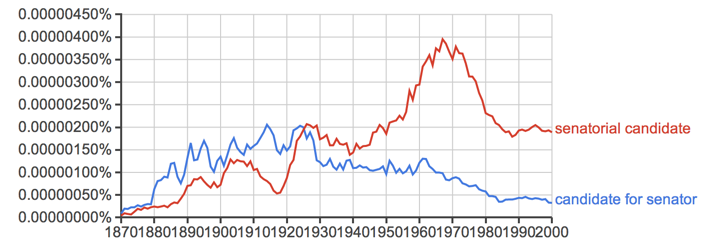
Judicial is holding steady:
And congressional, though not quite the same derivational pattern, seems to be prospering:
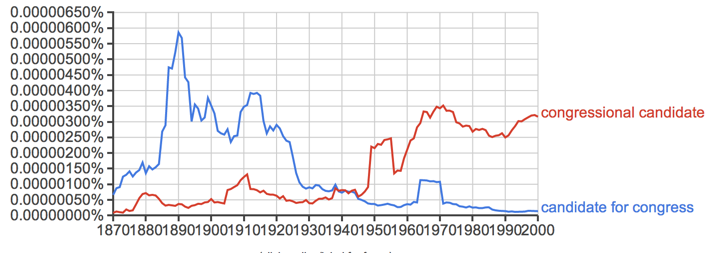
Gubernatorial, by this metric, has not declined nearly as much as "candidate for governor", and is still holding its own — the biggest historical change was not its fall (from 1967 to 1987) but its rise (through the 20th century to 1967):
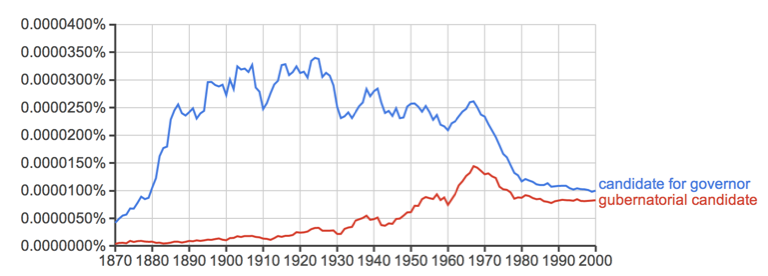
This plot shows gubernatorial candidate holding steady over the period where Zorn's tables show gubernatorial falling. Is this a difference between books and newspapers? Between the Chicago Tribune and the rest of the world?
I'm not sure — but story counts from the New York Times suggests that Zorn's Chicago counts may not be representative of the journalistic world at large, and in any case omit the 800-pound gorilla of candidate-for-governor phraseology, "candidate for governor":
| YEAR | gubernatorial candidate | governor candidate | candidate for governor |
| 1998 | 53 | 1 | 374 |
| 2002 | 27 | 3 | 1360 |
| 2006 | 57 | 8 | 9910 |
| 2010 | 108 | 6 | 1500 |
More evidence for surprising differentiation in local linguistic culture, I guess…
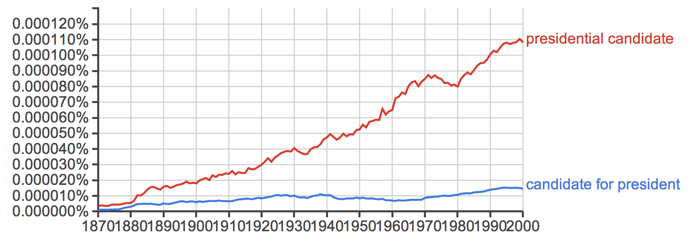
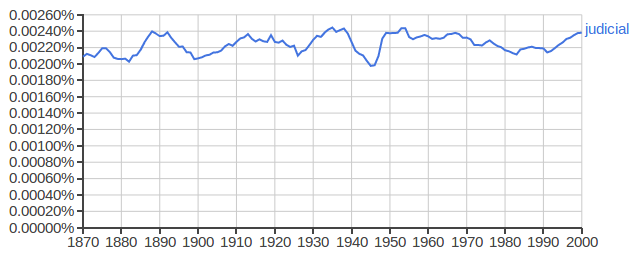
Anders said,
February 15, 2014 @ 8:58 am
Not that it matters much, but surely "consistency" would demand gubernator, not gubernor (as Zorn has it). That if, if both the noun and the adjective had to be borrowed directly from Latin (but why would that necessarily be the case?)
djw said,
February 15, 2014 @ 10:17 am
I'm pretty sure Shrub considered himself the gubernator of Texas while he was in office; fits the profile.
[(myl) No, I believe that was Arnold Schwarzenegger.]
Avinor said,
February 15, 2014 @ 10:39 am
Isn't this quite common in English: the noun Germanic (or possibly Norman-French), the adjective from Latin?
cow/bovine, cat/feline…
Jan Freeman said,
February 15, 2014 @ 12:44 pm
In his 1848 Dictionary of Americanisms, John Russell Bartlett listed "gubernatorial" among words ”whose origin has grown out of our peculiar institutions, and which consequently are of a permanent nature.” That is, we had a lot of governors (and elections) and had to have an adjective, however ungainly. (Also on his list: caucus, lobby, mileage, and bunkum.)
bpop said,
February 15, 2014 @ 2:36 pm
Avinor – 'governor' is also from Latin, just via French.
bpop said,
February 15, 2014 @ 2:38 pm
Avinor – ah, misread your post, my mistake.
dw said,
February 15, 2014 @ 3:14 pm
@Avinor:
"Governor" isn't Germanic: it comes from French. It used to be spelled "Governour", but even the Brits have abandoned that spelling.
Jon said,
February 15, 2014 @ 5:11 pm
'Gubernatorial' is classified in my (British) mind as 'weird, exclusively American word'. But the OED, though it says 'chiefly US', does have some older English examples, including one from Disraeli.
We used to have Governors in the colonies, but have now put that behind us, and only have them on steam engines.
hanmeng said,
February 15, 2014 @ 8:45 pm
They often prove themselves to be a bunch of goobers (in the sense of "a naive, ignorant, or foolish person", not "peanut"), anyway.
dw said,
February 16, 2014 @ 12:44 am
@Jon:
The remaining British colonies, now rebranded as "Overseas Territories" (Gibraltar, Bermuda, the Falklands, etc), still have governors.
David Morris said,
February 16, 2014 @ 1:51 am
Australia's states have a governor each, and Australia has a Governor-General, appointed by the Queen on the advice of the state premier or prime minister respectively. The usual adjective is 'vice-regal'.
Kenny Easwaran said,
February 16, 2014 @ 12:54 pm
I was very pleased when I discovered that gubernat- is just the Latin cognate of the Greek word that gives rise to cybernet-. They've come to have very different associations in English, but they're both originally about executive control of systems.
Mr Punch said,
February 16, 2014 @ 12:58 pm
The Chicago Tribune, no slave to convention, used to be famous for its use of simplified spelling (e.g., "nite"). Could well be an outlier.
Eric Zorn said,
February 16, 2014 @ 5:11 pm
Thanks for this follow up post and your additional research, which I've included, along with some of my own control research, in the updated print-version post on this topic: http://blogs.chicagotribune.com/news_columnists_ezorn/2014/02/save-the-goober.html
It may well be that a few grumpy editors and their compliant writers or vice versa here at the Tribune have conspired to put out a semi-fatwah on "gubernatorial."
Rod Johnson said,
February 17, 2014 @ 3:15 pm
What interests me are latinate forms of proper names. For example, when Montague Grammar was in vogue, some authors would use the adjectival form "Montagovian" and others "Montagolfian" (though only the former shows up on Google).
Mark Dunan said,
February 19, 2014 @ 2:13 am
@Mr Punch —
Does the Chicago Tribune still use "nite"? When they owned the Chicago Cubs, the spelling "nite game" was used for "night game" on the scoreboard, seen here, and that spelling is still used now even though the Tribune no longer owns the team. The "correct" spelling could be brought back, and even written diagonally over many rows like they often do when there are many night games going on, but "nite" is just that little bit easier on the scoreboard operators!
@Rod — Spinning off from your thought, I've always found it interesting that when forming those adjectives, a rule that [w] (and [h]) change somehow comes into force, so in addition to Montague, Shaw becomes "Shavian" and Noah becomes "Noachian". Come to think of it, I can't tell how to say that last word. My instinct is to use a German-ch-like [ç]!
Rodger C said,
February 21, 2014 @ 7:54 am
@Kenny Easwaran: It's not a cognate, it's an oral borrowing.